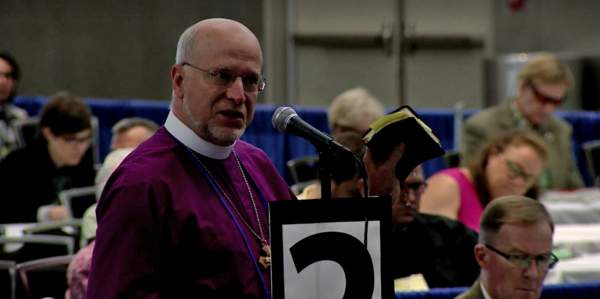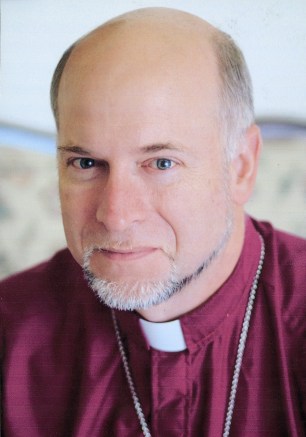
Bishop William Love of the Diocese of Albany tells General Convention on July 11 during the House of Bishops debate on liturgical marriage-equality Resolution B012 that passing the measure would force him to violate his ordination vows. Photo: ENS screenshot
[Episcopal News Service] Presiding Bishop Michael Curry has temporarily restricted a portion of Diocese of Albany Bishop William Love’s ministry because of Love’s refusal to allow same-sex marriages even after General Convention mandated liturgical marriage equality in the church’s U.S. dioceses.
Love is forbidden from punishing “in any matter regarding any member of the clergy that involves the issue of same-sex marriage,” Curry said in a document released Jan. 11. The restriction pertains to both The Episcopal Church’s formal Title IV disciplinary process and to any action “that has or may have the effect of penalizing in any way any member of the clergy or laity or worshipping congregation of his diocese for their participation in the arrangements for or participation in a same-sex marriage in his diocese or elsewhere.”
The restriction appears to enable Episcopal Church clergy in the upstate New York diocese to solemnize the marriages of gay and lesbian couples, something Love steadfastly refused to allow.
Curry also said Love’s conduct surrounding the issue “may constitute a canonical offense,” namely for violating his ordination vows and for conduct unbecoming a member of the clergy. The presiding bishop has referred Love’s refusal to obey convention’s Resolution 2018-B012 to the Rt. Rev. Todd Ousley, the church’s bishop for pastoral development and intake officer for disciplinary matters involving bishops. In the church’s Title IV disciplinary process an intake officer’s role is to obtain as much information as possible about the alleged misconduct, short of a full investigation. His or her key goal is to decide whether or not the facts presented, if any were true, would constitute an “offense” under the canons.
The restriction on Love will remain in effect until any Title IV process pending against him is resolved, Curry said. The presiding bishop added that he, or the next presiding bishop if the process extends beyond the November 2024 end of his term, will “review the continued necessity of this restriction from time to time and amend or lift it as appropriate.”
“While I am persuaded of the sincerity and good will of Bishop Love in these difficult circumstances, I am convinced that Resolution B012 was intended by the Convention to be mandatory and binding upon all our Dioceses,” Curry wrote.
He said that, as presiding bishop, “I am called upon to take steps to ensure that same-sex marriage in The Episcopal Church is available to all persons to the same extent and under the same conditions in all dioceses of the Church where same-sex marriage is civilly legal.”
Episcopal News Service has asked Love to comment and will update this story when it is received.
The dispute arose when Love said Nov. 10 that he would not allow same-sex couples to be married by priests in that diocese. He acknowledged that he could face disciplinary proceedings by the church for refusing to obey convention’s requirement.
Shortly after Love released his pastoral letter Curry affirmed General Convention’s authority, saying that “those of us who have taken vows to obey the doctrine, discipline and worship of the Episcopal Church must act in ways that reflect and uphold the discernment and decisions of the General Convention of the church.” Curry said in his Jan. 11 statement that he spoke with Love and consulted with a broad range of Episcopal Church leaders before reaching his decision.
How the actions of General Convention led to this decision
General Convention in 2015 authorized two marriage rites for trial use (via Resolution A054) by both same-sex and opposite-sex couples. The bishops and deputies also made the canonical definition (via Resolution A036) of marriage gender-neutral.
A054 said that the bishops of the church’s domestic dioceses needed to give their permission for the rites to be used. (The Episcopal Church includes a small number of dioceses outside the United States in civil jurisdictions that do not allow marriage for same-sex couples.) Even if they opposed same-sex marriage, A054 said that all bishops “will make provision for all couples asking to be married in this church to have access to these liturgies.”
There was widespread acceptance of the rites across the church. However, eight diocesan bishops in the 101 domestic dioceses did not authorized their use. They were Love, Central Florida Bishop Greg Brewer, Dallas Bishop George Sumner, Florida Bishop John Howard, North Dakota Bishop Michael Smith, Springfield Bishop Dan Martins, Tennessee Bishop John Bauerschmidt and Virgin Islands Bishop Ambrose Gumbs.
The eight required couples wanting to use the rites to be married outside their dioceses and away from their home churches. Some bishops, including Love, refused to allow priests in their diocese to use the rites anywhere.
Last July, convention attempted to remedy to the situation by passing the the often-rewritten and often-amended Resolution B012, which went into effect on the First Sunday of Advent, Dec. 2, Bishops and deputies moved the authority for deciding to use the rites from the diocesan bishop to parish priests. B012 said diocesan bishops who do not agree with same-sex marriage “shall invite, as necessary,” another Episcopal Church bishop to provide “pastoral support” to the couple, the clergy member involved and the congregation. Some of the eight bishops have interpreted B012 as requiring – or allowing them to require – the involvement of another bishop.
Love, who has refused to honor B012 at all, made his opposition to it clear during General Convention. In a House of Bishops debate on July 11 Love spoke for nearly 10 minutes, despite being told that he was exceeding the agreed-to two-minute individual limit. He said the passage of B012 would put him in the awkward position of violating of his ordination vows because its intent goes against the word of God found in Scripture, which ordained Episcopalians vow to uphold.“There has been a lot of discussion as we have struggled with this issue over the past several years on whether or not sexual intimacy within that of a same-sex couple was appropriate,” he said.
“There are many in this church who have proclaimed that it is and that this is a new thing that the Holy Spirit is revealing and that the Episcopal Church is being prophetic in putting this forward, and ultimately the rest of the body of Christ will come to understand that.”
He said he did not believe “that that’s necessarily true.”
Love added that the church has listened to people’s personal experiences and to their “feelings, their emotions, but we have not had an honest look at what God has said about this issue and how best to help people who find themselves in same-sex relationships.”
Love argued in his eight-page pastoral letter that obeying B012 would cause him to destroy rather than “guard the faith, unity and discipline of the church,” as he and all bishops vow to do during their ordination and consecration. In addition to that vow, all ordained Episcopalians pledge to “conform to the doctrine, discipline, and worship of The Episcopal Church.”
Love said that while he respects the authority of General Convention “as an institutional body,” his “ultimate loyalty as a bishop in God’s holy Church is to God.”
He also argued that obeying Resolution B012 would require him to violate his vow to uphold the Albany canons, one of which (Canon XVI here) forbids diocesan clergy from officiating, participating or facilitating same-sex marriages in public or in private. “Unions other than those of one man and one woman in Holy Matrimony, even if they be recognized in other jurisdictions, shall be neither recognized nor blessed in this Diocese,” the canon says.
At the end of his letter he said that “until further notice” the trial rites authorized by Resolution B012 “shall not be used anywhere in the Diocese of Albany by diocesan clergy (canonically resident or licensed).”
As the diocese awaited the presiding bishop’s decision, Love brought the controversy into his Christmas message, likening his journey to the unanswered questions that Mary and Joseph faced when they responded to God’s call. “Are we, like Mary and Joseph, willing to risk our reputations, our relationships, our jobs and livelihood?” he asked in part.
Meanwhile in the other seven dioceses
Love is the only one of the church’s 101 domestic diocesan bishops who is flatly refusing to conform to B012. Gumbs is the only one of the eight who previously refused to allow use of the rites has told his clergy to offer them without further obstacles.
Central Florida and Dallas have canons that restrict marriage to heterosexual couples, in addition to Albany. Brewer in Central Florida and Sumner in Dallas have turned over to another bishop part of all of their pastoral oversight of any congregation that wishes to provide the rites, as has North Dakota’s Smith. Martins in Springfield has said he plans to do the same.
Florida’s Howard has said he would do the same, however some in that diocese have told ENS they are confused and worried about his process to accomplish that delegation.
Tennessee Bishop John Bauerschmidt has yet to articulate his policy, although he had pledged to have a process for enacting B012 sometime this month.
Read more about it
- The presiding bishop said Love’s disciplinary process will center on two sections of Title IV: Canon IV.4(1)(c) (“abide by the promises and vows made when ordained”) and Canon IV.4(1)(h)(9) (“any Conduct Unbecoming a Member of the Clergy”). Those part of canons can be found on pages 206 and 207 here. The canons define conduct unbecoming a member of the clergy as “any disorder or neglect that prejudices the reputation, good order and discipline of the Church, or any conduct of a nature to bring material discredit upon the church or the holy orders conferred by the church.”
- The text of Curry’s restriction on Love is here.
- More information about how Title IV proceedings cane be found on this interactive website.
– The Rev. Mary Frances Schjonberg is the Episcopal News Service’s senior editor and reporter.
The post Presiding Bishop bars Albany bishop from punishing priests for same-sex marriages, seeks discipline proceeding for possible ‘canonical offense’ appeared first on Episcopal News Service.
This post appeared here first: Presiding Bishop bars Albany bishop from punishing priests for same-sex marriages, seeks discipline proceeding for possible ‘canonical offense’
[Episcopal News Service – General Convention 2018]

